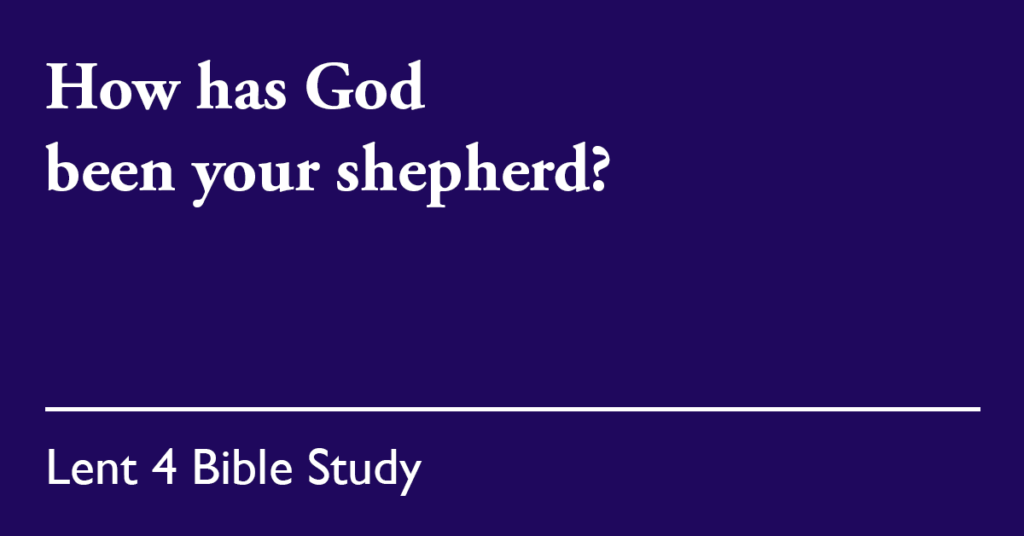Bible Study: Lent 4 (A) – 2023
March 19, 2023
[RCL] 1 Samuel 16:1-13; Psalm 23; Ephesians 5:8-14; John 9:1-41

1 Samuel 16:1-13
This story places us in a precarious moment in the history of the Israelites. After much badgering, God has agreed to give the people a king and Saul had been elevated to the role. But the novice monarch has already disappointed God and Samuel is sent out to discover his successor. Sent to Jesse the Bethlehemite, seven strapping sons are paraded in front of Samuel, but none are them are God’s chosen. It is only when Samuel asks that they bring David, the youngest, from minding the sheep. And it turns out that this young child, an afterthought, is God’s anointed.
Throughout Scripture, we are reminded of God’s solidarity with the weak and oppressed, and this passage from 1 Samuel is a perfect example of that. Whatever David became—warrior, king, tyrant—he started out as a small, weak little boy, not considered worth the attention of the great prophet Samuel. This is the surprise of God; God does not “see as mortals see.” We are enamored with the outward trappings of appearance—fine clothes, expensive cars, etc.—but God “looks on the heart.”
It is also worth noting the similarities between David’s anointing and the baptism of Jesus. “The spirit of the Lord came mightily upon David,” just as “the Spirit descend[ed] like a dove upon [Jesus].” The title “Messiah” and its Greek counterpart, “Christ,” mean “anointed one,” and the parallels between David and Jesus are not a coincidence.
- Where has God surprised you in your life?
- How have people you might have overlooked or underestimated proven to be God’s anointed?
Psalm 23
Honestly, what is there to say about Psalm 23 that has not been said? These are some of the best-known words in all of Scripture and have spawned countless cultural references, both secular and religious. As we meditate on these words in the context of Lent, verse 4— “Though I walk through the valley of the shadow of death”—holds particular resonance. The trials and temptations of the wilderness are many and it is easy to think we are walking the road alone. But as this comforting psalm reminds us, even in the darkest depths, God is at our side; our shepherd will never abandon us.
- How has God been your shepherd?
- What “right pathways” might God be leading you toward?
Ephesians 5:8-14
This passage from Ephesians fits into a broader theme of the letter: God’s lordship over all creation and our duty, as Christians, to walk in the light of God. Paul is concerned with the malevolent forces of this world and the human tendency to be drawn into “darkness,” but he assures his readers that following Christ will keep us in the light.
The danger of this passage is how easily interpreters can claim the title “children of light” for themselves, how tempting it is to judge and assert that others are living in “darkness.” This presumption is tempered by verse 10: “Try to find out what is pleasing to the Lord.” The humility of this phrase is beautiful and subtle. Ultimately, we cannot fully know who God is or what God wants—we can make educated inferences based on Scripture, but on this side of the veil, God remains a mystery. So let us try to walk in the light and hope that God is pleased with our efforts.
- Where might darkness be in your life? And what might God’s call to the light be?
- What is a “child of light” and how might you claim that title?
John 9:1-41
This passage from John’s gospel dwells on an essential theme of the evangelist, rich with symbolic meaning. On its surface, the story is of Jesus healing a blind man and its confusing, almost silly, aftermath. As readers, we are bemused by the obstinate refusal of the Pharisees to see what has plainly occurred in front of them. Even as the formerly blind man attests to Jesus’s healing power, they cannot accept the facts of the story. No number of witnesses will open their eyes to the reality of what has occurred.
Yet this story is about so much more than an act of healing. Blindness and sight, darkness and light, ignorance and understanding—all of these dichotomies are at play and remind us of John’s overarching vision in this gospel. Jesus is “the light of the world” and it is through Christ that we come to know God.
Nevertheless, it is important to remember that we have the advantage of John’s narrative voice pointing out the stubborn blindness of the Pharisees. It is easy to see that Jesus is Lord with the benefit of hindsight, and it is easy to laugh at the Pharisees for missing what was plain to see. But are we so different? Are we not sometimes Pharisees too—so confident in our worldview that we fail to see what is evident to someone else?
- Where in your life might you be blind to God’s work?
¡No olvide suscribirse al podcast Sermons That Work para escuchar este sermón y más en su aplicación de podcasting favorita! Las grabaciones se publican el jueves antes de cada fecha litúrgica.


